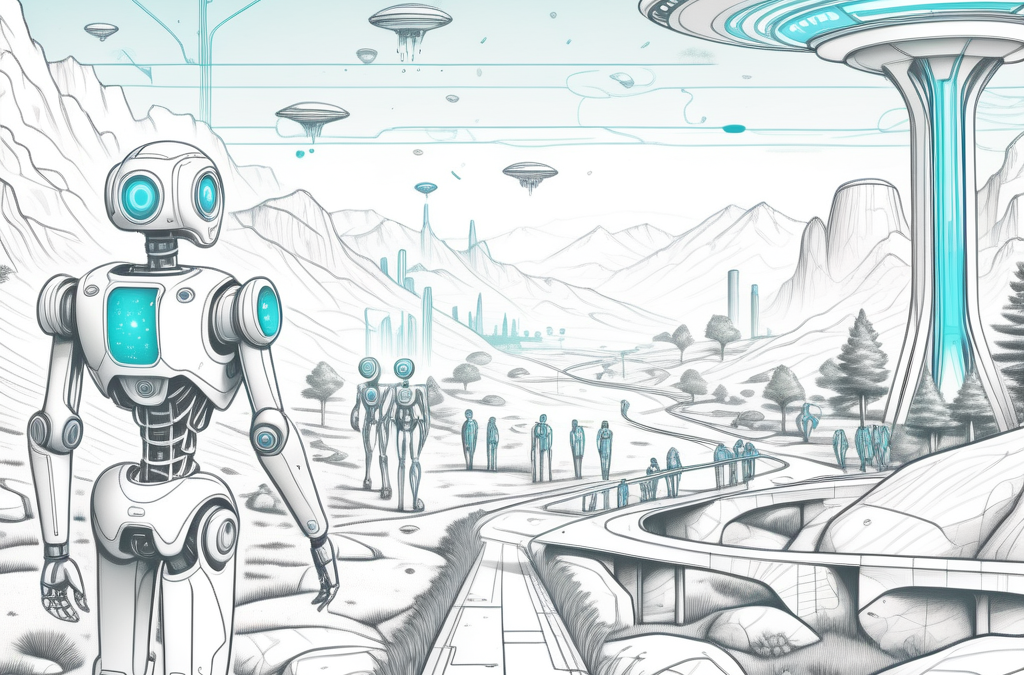I. Introduction: Exploring the Frontiers of Artificial Intelligence
Imagine a world where machines can think, learn, and act like humans, but without the same moral compass. Welcome to the realm of Artificial Intelligence (AI), where innovation and responsibility collide. As AI becomes increasingly integrated into our lives, it’s essential to examine the ethics and responsibilities surrounding its development and use.
In this article, we will explore the thrilling yet complex landscape of AI ethics, uncovering how we can harness this powerful technology while ensuring it serves humanity positively.
II. Understanding Artificial Intelligence
AI is like giving machines a brain of their own, enabling them to perform tasks that typically require human intelligence through advanced algorithms and vast amounts of data.
Everyday Examples of AI:
- Social Media: AI filters your feed, showing you posts that align with your interests.
- Entertainment: Streaming services like Netflix use AI to recommend shows based on your viewing history.
- Gaming: AI creates challenging opponents that adapt to your gameplay style.
AI’s applications extend beyond entertainment, playing crucial roles in fields such as:
- Healthcare: Assisting doctors in diagnosing diseases.
- Meteorology: Helping scientists predict weather patterns.
- Engineering: Aiding in the design of safer vehicles.
The most exciting aspect of AI? It’s always learning! Every interaction you have with AI helps it grow, making you a part of its educational journey.
III. The Foundations of Ethics
Understanding ethics is key to ensuring that technology, including AI, is used for good. Ethics serve as guidelines that help us determine right from wrong, especially in tech.
Why Ethics Matter in AI:
- Prevent Misuse: Guidelines help keep AI usage responsible and fair, ensuring a positive impact on society.
- Fair Decision-Making: AI must be programmed to make unbiased decisions, promoting equal opportunities for all.
Key Ethical Considerations:
- Privacy: Protecting personal data from unauthorized access is essential.
- Transparency: Users should understand how AI systems make decisions.
By grasping these ethical foundations, you can contribute to a future where technology benefits everyone responsibly.
IV. The Responsibility of AI in Society
As AI becomes a bigger part of our lives, understanding responsibility is vital. This includes both creators and users.
Who is Responsible?
- Developers: Responsible for designing safe and fair AI systems.
- Users: Must use AI tools correctly and ethically.
Ethical Programming:
AI should be programmed to make wise choices, much like how your parents guide you. For example, AI in hiring processes needs to be fair and unbiased.
Real-life scenarios demonstrate this responsibility:
- Self-Driving Cars: Involved in accidents raise questions about accountability.
- AI in Healthcare: Helps doctors but also requires constant monitoring to ensure effectiveness.
V. Decoding AI Ethics: Key Principles
To navigate the ethical landscape of AI, we must embrace foundational principles:
Core Principles of Ethical AI:
- Fairness: AI systems must treat everyone equally, avoiding biased decisions.
- Transparency: Understanding how AI arrives at conclusions builds trust.
- Privacy: Personal data should be safeguarded, only using what’s necessary.
- Accountability: When mistakes occur, responsibility must be assigned.
By focusing on these principles, you can be a savvy tech user and potentially become an innovator in AI.
VI. Ethical Issues in AI
While AI holds immense potential, it also presents challenges that must be addressed.
Major Ethical Issues:
- Discrimination: AI can reflect societal biases if trained on non-diverse datasets, leading to unfair outcomes in areas like facial recognition.
- Surveillance: Balancing security and privacy is crucial as AI monitors activities.
- Job Displacement: While AI can automate tasks, it can also create new job opportunities, emphasizing the need for skill development.
- Misinformation: AI-generated deepfakes can spread false information, challenging truth in media.
Understanding these issues equips you to advocate for responsible AI development.
VII. How AI Impacts Ethical Decision Making
AI is transforming our decision-making processes, especially regarding ethics.
Key Considerations:
- Recommendations: Relying on AI for choices can shape our preferences—think critically about the influence of algorithms.
- Human Judgment: AI lacks the emotional understanding required for moral decision-making. Human oversight is essential in significant ethical choices.
As you engage with AI, question its systems and the fairness of its decisions.
VIII. The Role of Youth in AI Ethics
Young tech enthusiasts play a crucial role in shaping the future of AI ethics.
Steps to Get Involved:
- Educate Yourself: Understand the ethical implications of AI. Ask questions like: How does it work? Who does it impact?
- Share Knowledge: Advocate for ethical AI practices with peers.
- Join or Start Initiatives: Get involved in coding clubs or ethics discussions at school.
As future innovators, continuously evaluate your AI projects for fairness, transparency, and accountability.
IX. Conclusion: Shaping a Responsible Future with AI
As we conclude our exploration of AI ethics and responsibility, it’s clear we stand at the edge of an exciting new frontier. The choices we make about AI today will shape the world for future generations.
Key Takeaways:
- Prioritize fairness, transparency, and accountability in AI development and use.
- Balance the benefits of AI with the need for human oversight.
- Engage actively in discussions about the ethical implications of AI.
The future of AI is bright, and your involvement is crucial. Embrace your role as a responsible tech innovator and help create an AI-driven world that respects human rights and promotes equity. The journey starts now—let your curiosity lead the way!


